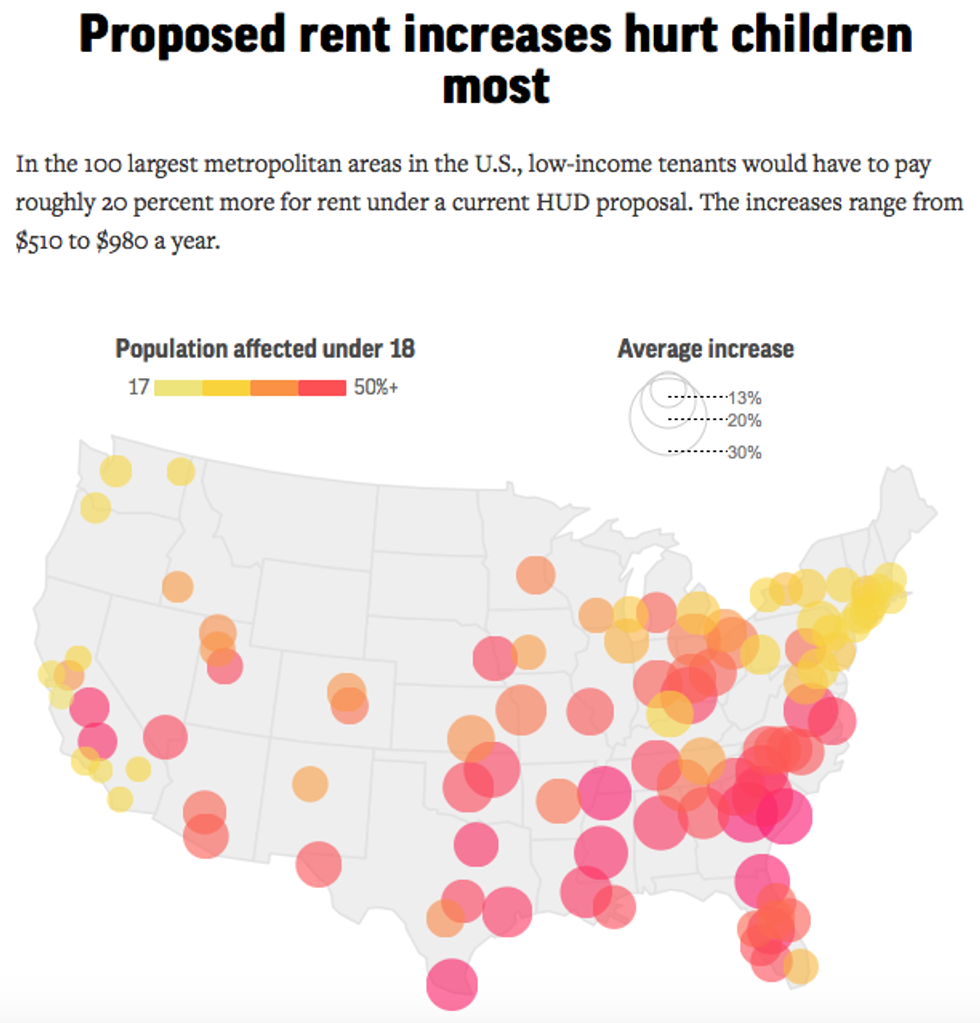
The Henry Rutgers Houses, a public housing development built and maintained by the New York City Housing Authority (NYCHA), is located on Manhattan's Lower East Side. The largest number of people who would be impacted by the Trump administration's housing assistance overhaul live in New York state. (Photo: Drew Angerer/Getty Images)
After Countless Billions Lavished on Wealthy, Trump Plan Would Spike Rents of Poor Americans by 20%
"I saw public housing as an option to get on my feet," says a pediatric assistant with four children. "But this would put us in a homeless state."
As the Republican Party has lavished the nation's wealthiest individuals and corporations with billions upon billions in gifts and tax giveaways, a new analysis found the Trump administration's proposed changes to government housing assistance would mean a 20 percent spike in rent rates for millions of poor Americans in cities across the United States--particularly impacting households of seniors, children, and people with disabilities.
"Raising rents on low-income people would force them to divert resources from other basic needs and expose some to eviction and homelessness."
--Will Fischer, CBPP
The Center for Budget and Policy Priorities (CBPP) on Thursday laid out how the Trump plan--put forth by Housing and Urban Development (HUD) Secretary Ben Carson in April--would affect recipients of housing assistance across all 50 states and in the nation's top 100 metropolitan areas.
Immediately denounced as "the stuff of slumlords," the HUD proposal would increase assistance recipients' mandated rent contributions from 30 percent of their income to 35 percent, and add work requirements for many of them. When fully phased in, the plan would raise rents nationally by $3.2 billion, according to CBPP.
"Raising rents on low-income people would force them to divert resources from other basic needs and expose some to eviction and homelessness," CBPP senior policy analyst Will Fischer warns in a blog post about the study. More than three-quarters of the rent increases, Fisher notes, would target working-poor families with children, seniors, and people with disabilities.
In New York state alone, which has the highest number of HUD-assisted households in the country, more than a million people would be impacted by the changes--including 327,900 children. In South Carolina, Trump's plan would affect some 61,500 kids.
Ebony Morris, a pediatric assistant who lives in South Carolina with her four young children, told the Associated Press the HUD proposal would increase her monthly rent from $403 to $600, and likely put her family out on the streets.
"Food, electricity bills, school uniforms," she said. "Internet for homework assignments and report cards. All of their reading modules at school require the internet, without it they'll be behind their classmates. The kids are in extracurriculars, those would be scrapped. I would struggle just to pay my bills. It would be very, very, very hard."
"I saw public housing as an option to get on my feet, to pay 30 percent of my income and get myself out of debt and eventually become a homeowner," Morris added. "But this would put us in a homeless state."
Nationally, more than three million American children living in low-income households would be impacted by the rent raises proposed in the Trump administration's housing plan.

In addition to the HUD plan, CBPP also analyzed the impacts of a similar draft bill (pdf) from Rep. Dennis Ross (R-Fla.), vice chairman of the House Financial Services Housing and Insurance Subcommittee.
"Policymakers should set aside these harmful proposals," Fischer concludes, "which would undercut federal rental assistance and impose hardship on some of the nation's most vulnerable people."
An Urgent Message From Our Co-Founder
Dear Common Dreams reader, The U.S. is on a fast track to authoritarianism like nothing I've ever seen. Meanwhile, corporate news outlets are utterly capitulating to Trump, twisting their coverage to avoid drawing his ire while lining up to stuff cash in his pockets. That's why I believe that Common Dreams is doing the best and most consequential reporting that we've ever done. Our small but mighty team is a progressive reporting powerhouse, covering the news every day that the corporate media never will. Our mission has always been simple: To inform. To inspire. And to ignite change for the common good. Now here's the key piece that I want all our readers to understand: None of this would be possible without your financial support. That's not just some fundraising cliche. It's the absolute and literal truth. We don't accept corporate advertising and never will. We don't have a paywall because we don't think people should be blocked from critical news based on their ability to pay. Everything we do is funded by the donations of readers like you. Will you donate now to help power the nonprofit, independent reporting of Common Dreams? Thank you for being a vital member of our community. Together, we can keep independent journalism alive when it’s needed most. - Craig Brown, Co-founder |
As the Republican Party has lavished the nation's wealthiest individuals and corporations with billions upon billions in gifts and tax giveaways, a new analysis found the Trump administration's proposed changes to government housing assistance would mean a 20 percent spike in rent rates for millions of poor Americans in cities across the United States--particularly impacting households of seniors, children, and people with disabilities.
"Raising rents on low-income people would force them to divert resources from other basic needs and expose some to eviction and homelessness."
--Will Fischer, CBPP
The Center for Budget and Policy Priorities (CBPP) on Thursday laid out how the Trump plan--put forth by Housing and Urban Development (HUD) Secretary Ben Carson in April--would affect recipients of housing assistance across all 50 states and in the nation's top 100 metropolitan areas.
Immediately denounced as "the stuff of slumlords," the HUD proposal would increase assistance recipients' mandated rent contributions from 30 percent of their income to 35 percent, and add work requirements for many of them. When fully phased in, the plan would raise rents nationally by $3.2 billion, according to CBPP.
"Raising rents on low-income people would force them to divert resources from other basic needs and expose some to eviction and homelessness," CBPP senior policy analyst Will Fischer warns in a blog post about the study. More than three-quarters of the rent increases, Fisher notes, would target working-poor families with children, seniors, and people with disabilities.
In New York state alone, which has the highest number of HUD-assisted households in the country, more than a million people would be impacted by the changes--including 327,900 children. In South Carolina, Trump's plan would affect some 61,500 kids.
Ebony Morris, a pediatric assistant who lives in South Carolina with her four young children, told the Associated Press the HUD proposal would increase her monthly rent from $403 to $600, and likely put her family out on the streets.
"Food, electricity bills, school uniforms," she said. "Internet for homework assignments and report cards. All of their reading modules at school require the internet, without it they'll be behind their classmates. The kids are in extracurriculars, those would be scrapped. I would struggle just to pay my bills. It would be very, very, very hard."
"I saw public housing as an option to get on my feet, to pay 30 percent of my income and get myself out of debt and eventually become a homeowner," Morris added. "But this would put us in a homeless state."
Nationally, more than three million American children living in low-income households would be impacted by the rent raises proposed in the Trump administration's housing plan.

In addition to the HUD plan, CBPP also analyzed the impacts of a similar draft bill (pdf) from Rep. Dennis Ross (R-Fla.), vice chairman of the House Financial Services Housing and Insurance Subcommittee.
"Policymakers should set aside these harmful proposals," Fischer concludes, "which would undercut federal rental assistance and impose hardship on some of the nation's most vulnerable people."
As the Republican Party has lavished the nation's wealthiest individuals and corporations with billions upon billions in gifts and tax giveaways, a new analysis found the Trump administration's proposed changes to government housing assistance would mean a 20 percent spike in rent rates for millions of poor Americans in cities across the United States--particularly impacting households of seniors, children, and people with disabilities.
"Raising rents on low-income people would force them to divert resources from other basic needs and expose some to eviction and homelessness."
--Will Fischer, CBPP
The Center for Budget and Policy Priorities (CBPP) on Thursday laid out how the Trump plan--put forth by Housing and Urban Development (HUD) Secretary Ben Carson in April--would affect recipients of housing assistance across all 50 states and in the nation's top 100 metropolitan areas.
Immediately denounced as "the stuff of slumlords," the HUD proposal would increase assistance recipients' mandated rent contributions from 30 percent of their income to 35 percent, and add work requirements for many of them. When fully phased in, the plan would raise rents nationally by $3.2 billion, according to CBPP.
"Raising rents on low-income people would force them to divert resources from other basic needs and expose some to eviction and homelessness," CBPP senior policy analyst Will Fischer warns in a blog post about the study. More than three-quarters of the rent increases, Fisher notes, would target working-poor families with children, seniors, and people with disabilities.
In New York state alone, which has the highest number of HUD-assisted households in the country, more than a million people would be impacted by the changes--including 327,900 children. In South Carolina, Trump's plan would affect some 61,500 kids.
Ebony Morris, a pediatric assistant who lives in South Carolina with her four young children, told the Associated Press the HUD proposal would increase her monthly rent from $403 to $600, and likely put her family out on the streets.
"Food, electricity bills, school uniforms," she said. "Internet for homework assignments and report cards. All of their reading modules at school require the internet, without it they'll be behind their classmates. The kids are in extracurriculars, those would be scrapped. I would struggle just to pay my bills. It would be very, very, very hard."
"I saw public housing as an option to get on my feet, to pay 30 percent of my income and get myself out of debt and eventually become a homeowner," Morris added. "But this would put us in a homeless state."
Nationally, more than three million American children living in low-income households would be impacted by the rent raises proposed in the Trump administration's housing plan.

In addition to the HUD plan, CBPP also analyzed the impacts of a similar draft bill (pdf) from Rep. Dennis Ross (R-Fla.), vice chairman of the House Financial Services Housing and Insurance Subcommittee.
"Policymakers should set aside these harmful proposals," Fischer concludes, "which would undercut federal rental assistance and impose hardship on some of the nation's most vulnerable people."

